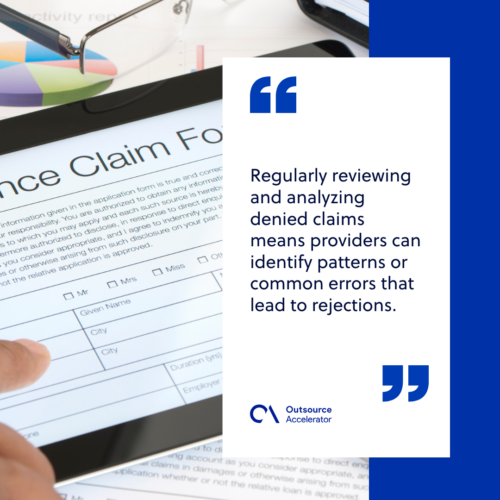Mastering claims processing: 5 Best practices for your remote teams

Claims processing involves the detailed management of healthcare service claims submitted by providers to insurance companies for reimbursement. This process includes verifying patient eligibility, assessing services rendered, and accurately coding to align with insurance policies.
According to World Health Systems Facts, in 2023, national healthcare spending in the United States reached $4.9 trillion, marking a 7.5% increase from the previous year.
To manage the complexities of claims processing, many healthcare practitioners turn to offshoring services provided by reputable BPOs like Sourcefit. Offshoring solutions in this particular sector help effectively streamline daily operations and reduce overhead.
In this article, we will explore five best practices to assist medical establishments in mastering claims processing for their remote teams.
Challenges in claims processing
Claims processing is a vital part of the healthcare industry, but it comes with its own set of challenges.
Healthcare providers often face difficulties in managing the complex and time-sensitive nature of claims, particularly:
- Coding errors. Incorrect or incomplete coding can delay the claims process and lead to denials or reduced reimbursements. Accurate coding is crucial to match the services provided with insurance requirements.
- Complex billing rules. Insurance companies have varying billing rules, and healthcare providers must navigate these intricacies. Failure to follow specific guidelines can result in claim rejection.
- Patient eligibility verification. Verifying a patient’s coverage and benefits before services are provided is often overlooked, leading to complications if claims are submitted for patients with no coverage or lapsed insurance.
- Claim denials and rejections. Denied claims require additional work for reprocessing, which can significantly increase the administrative workload. Rejections often happen due to minor errors or missing information.
- Time-consuming documentation. The need for extensive documentation and proper evidence to support claims can overwhelm providers, particularly with high patient volumes.
These drawbacks create inefficiencies that can delay reimbursement and affect cash flow. This is why many healthcare providers nowadays opt for offshoring services to reduce the burden on their in-house staff.

Mastering claims processing: 5 Best practices
Here are five effective practices to optimize claims processing:
1. Invest in staff training
Claims processing requires specialized knowledge in medical coding, insurance rules, and billing procedures. Well-trained employees are more adept at handling complex claims and adapting to changes in billing rules or coding standards.
Having ongoing training for remote staff members helps providers minimize errors and improve the overall accuracy of claims.
2. Utilize advanced software and technology
Adopting modern claims management software can significantly improve the efficiency of the claims process. These tools help automate routine tasks, validate data accuracy, and track the status of claims in real-time.
Integration with electronic health records (EHR) systems also streamlines data entry, reducing manual errors and delays.
3. Implement a pre-claim verification process
Verifying patient insurance eligibility before services are provided can prevent costly errors and denials. This practice involves checking the patient’s coverage, benefit limits, and other key information prior to submitting claims.
It minimizes the risk of claim rejection due to eligibility issues and reduces administrative work down the line.
4. Focus on accurate coding
Accurate coding is the backbone of successful claims processing. Providers should ensure that all services, diagnoses, and treatments are properly coded in line with insurance requirements.
This prevents unnecessary claim denials and rework, as insurance companies often reject claims with incorrect or missing codes.
5. Regularly review denied claims
A proactive approach to claim denials can significantly improve the reimbursement cycle. Regularly reviewing and analyzing denied claims means providers can identify patterns or common errors that lead to rejections.
Healthcare facilities will be able to correct issues before submitting new claims, reducing delays in future reimbursements.
Implementing these best practices will help healthcare providers stay on top of claims processing, minimize administrative errors, and improve overall cash flow.

Sourcefit’s remote claims processing meets your operational needs
Sourcefit’s remote claims processing service is designed to meet the unique operational needs of healthcare providers. It prioritizes accuracy, efficiency, and cost savings to simplify the claims process, minimize mistakes, and boost cash flow.
A highly skilled offshore team helps healthcare providers concentrate on delivering quality patient care while trusting their administrative tasks to experts.
Learn more about how Sourcefit’s remote claims processing solutions can optimize your operations and enhance your practice’s efficiency.







 Independent
Independent




